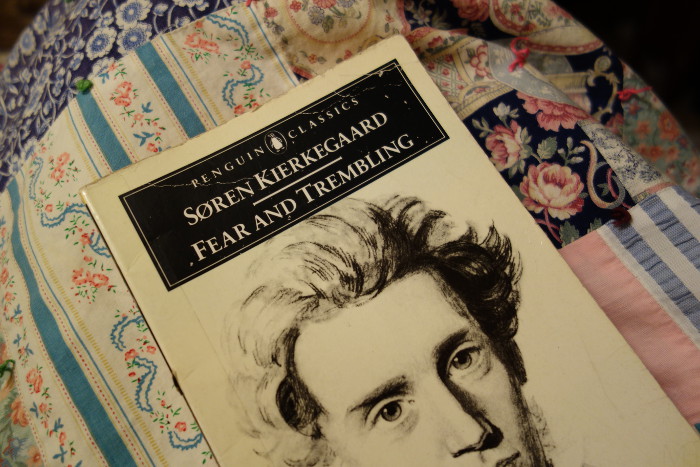Fear and Trembling - Abraham revisited
For he who loved himself became great in himself, and he who loved others became great through his devotion, but he who loved God became greater than all.
I gave this books 5 stars on Goodreads, but I almost gave it none. By that, I mean it is an almost impossible book to rate in a generic sense. I don't know where you are in your spiritual beliefs and growth, and so as a reviewer I can't possibly say what this book will be to you. On the other hand, to me it was a five-star book - the caveat is that my rating is inherently personal. Because of that, it may not be of much use here whether it has five stars or no rating.
To quote the first sentences of his biography, in this Penguin edition:
Søren Aabye Kierkegaard was born in Copenhagen in 1813, the youngest of seven children. His mother, his sisters and two of his brothers all died before he reached his twenty-first birthday.For context, Fear and Trembling was published in 1843 - he was only about thirty at the time. He had already lost these loved ones, and broken off his relationship with his fiancee, by the time this book entered the world. It's hard to imagine what he was feeling as he wrote it; maybe it helped him through these losses, to turn to philosophy and self-examination.
I wish I could say Kierkegaard is easy to read. He makes Chesterton seem tidy and concise - Kierkegaard reads like a person trying to think their way through a difficult problem, sometimes taking detours and rabbit trails, but always coming back to the main point. I was frustrated and utterly at sea at times; still, he makes you care so much about his main point that you keep going. In this sense, I love his writing: he is a real person thinking real thoughts, sacrificing tidiness and even "perfection" for a hammering-out, if you will, of all the things that he is trying to reconcile in his mind.
In a nutshell, Fear and Trembling is about the biblical story of Abraham and Isaac. I counted, and in this tiny book I have fifteen sticky notes for each quote that really struck me; I've never thought about Abraham and Isaac so much, which is exactly Kierkegaard's issue. "There were countless generations that knew the story of Abraham by heart, word for word. How many did it make sleepless?" (p. 58) He is right. The Old Testament has many challenging stories in it, but sometimes we are so used to them, we take them somewhat for granted (I know I have). Abraham preparing to sacrifice his promised son to God is one of the very hardest stories, when you look at it as with new eyes.
The key phrase Kierkegaard refers to throughout the book is, as the translator puts it, "the strength of the absurd." Faith is outside of, apart from, and higher than mere human logic and understanding, to the point it may appear foolish to the world - " the natural man receiveth not the things of the Spirit of God: for they are foolishness unto him" (I Cor. 2:14). To relate this to Abraham, Kierkegaard writes:
...he further makes, and at every moment is making, the movement of faith. This is his comfort. For he says, 'Nevertheless it won't happen, or if it does the Lord will give me a new Isaac on the strength of the absurd.'It compels you to slow down and see the reality of a man, who waited all his life to have a son, who was promised to have generations and generations of descendants, be told to kill that same son - then, through faith, to follow through unfalteringly until the very last moment when God stops him. Finally, as if for the first time, you see Abraham as the "knight of faith" which Kierkegaard reminds you he was.
There is much more I could say, but I'll leave it there. It's a short book, but takes some time to process. I still don't understand half of it, but he showed me something familiar in a new way, and that is a worthwhile read.




Comments
I really have to start my Kierkegaard journey. I have his The Present Age: On the Death of Rebellion sitting on my desk, which I've been meaning to read for about a year and a half. I should get on it.
I have Either/Or on my pile. We shall see how soon I get to it. Ha.